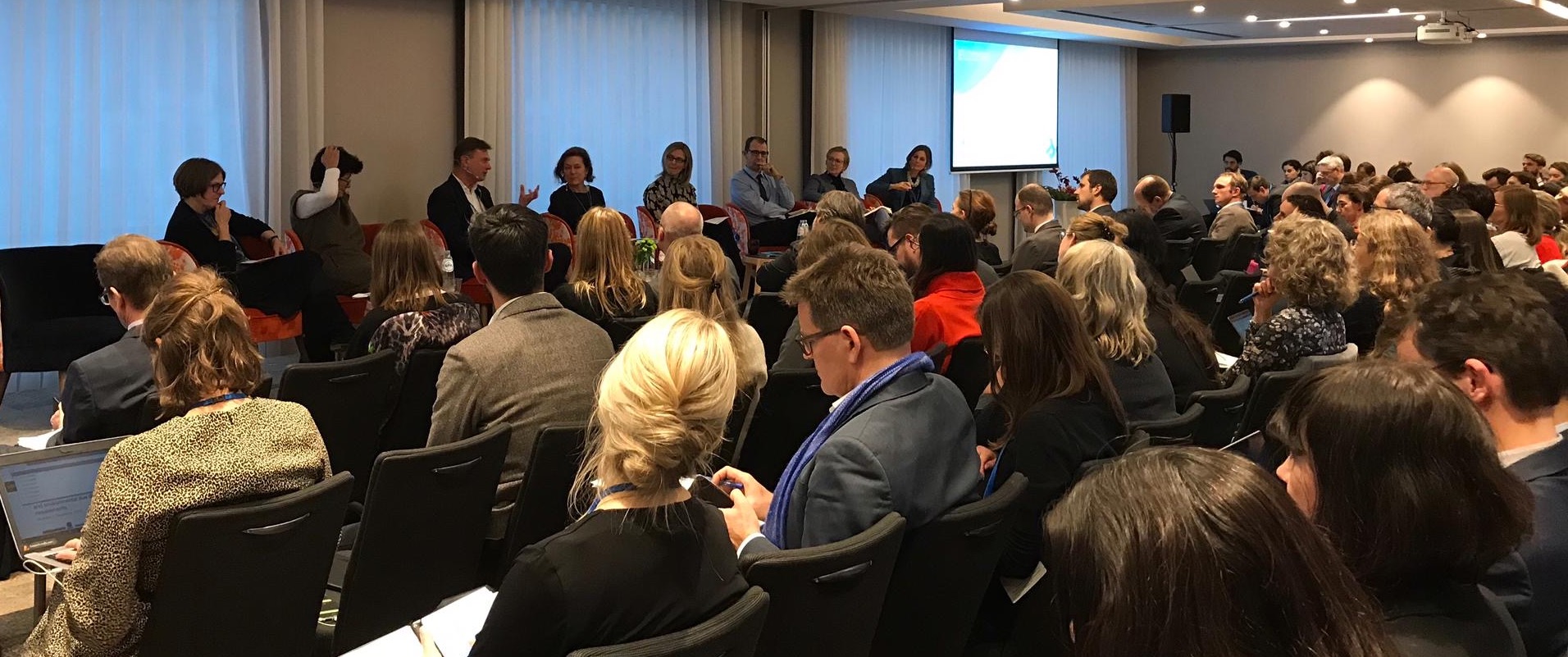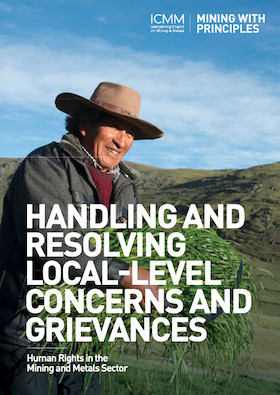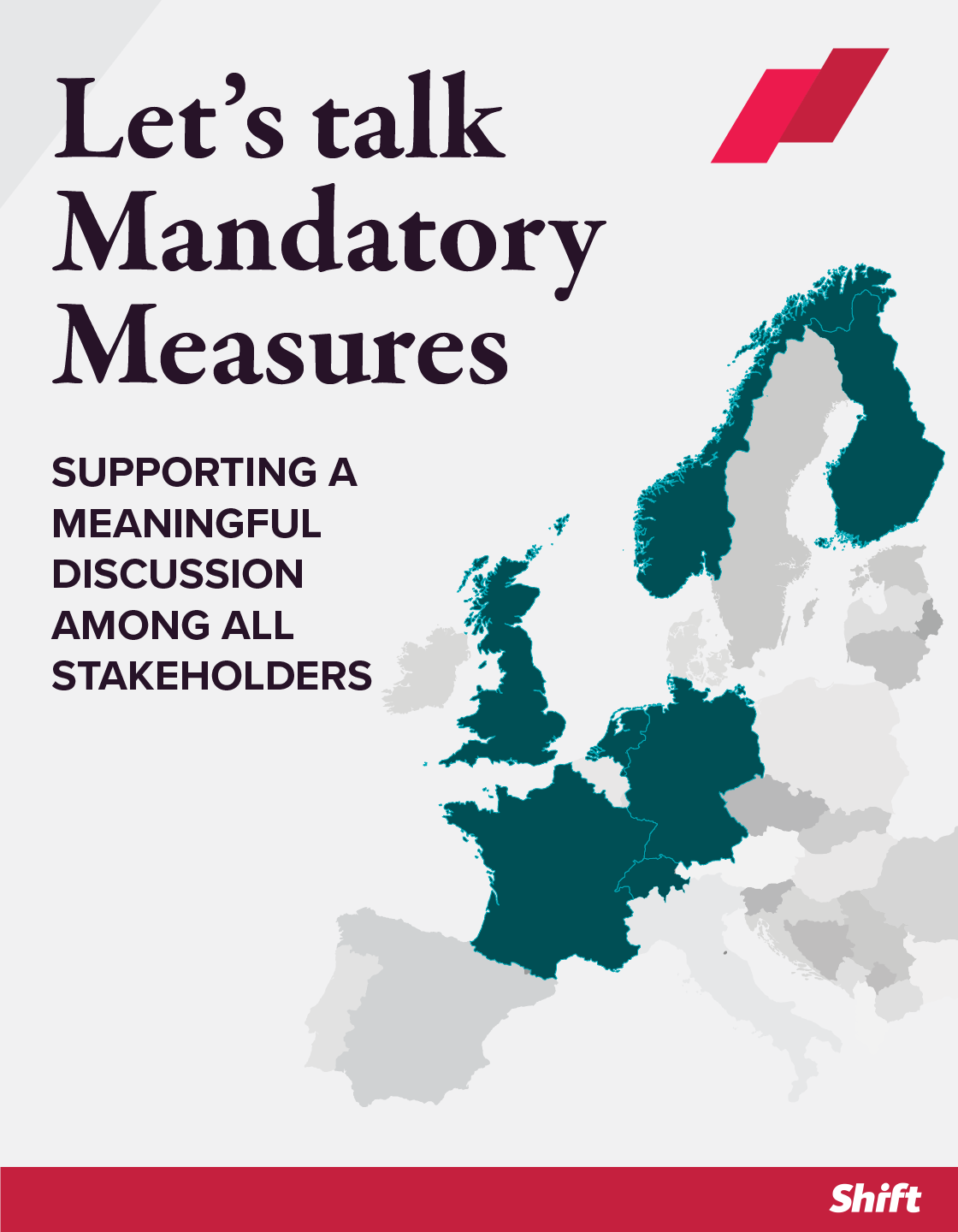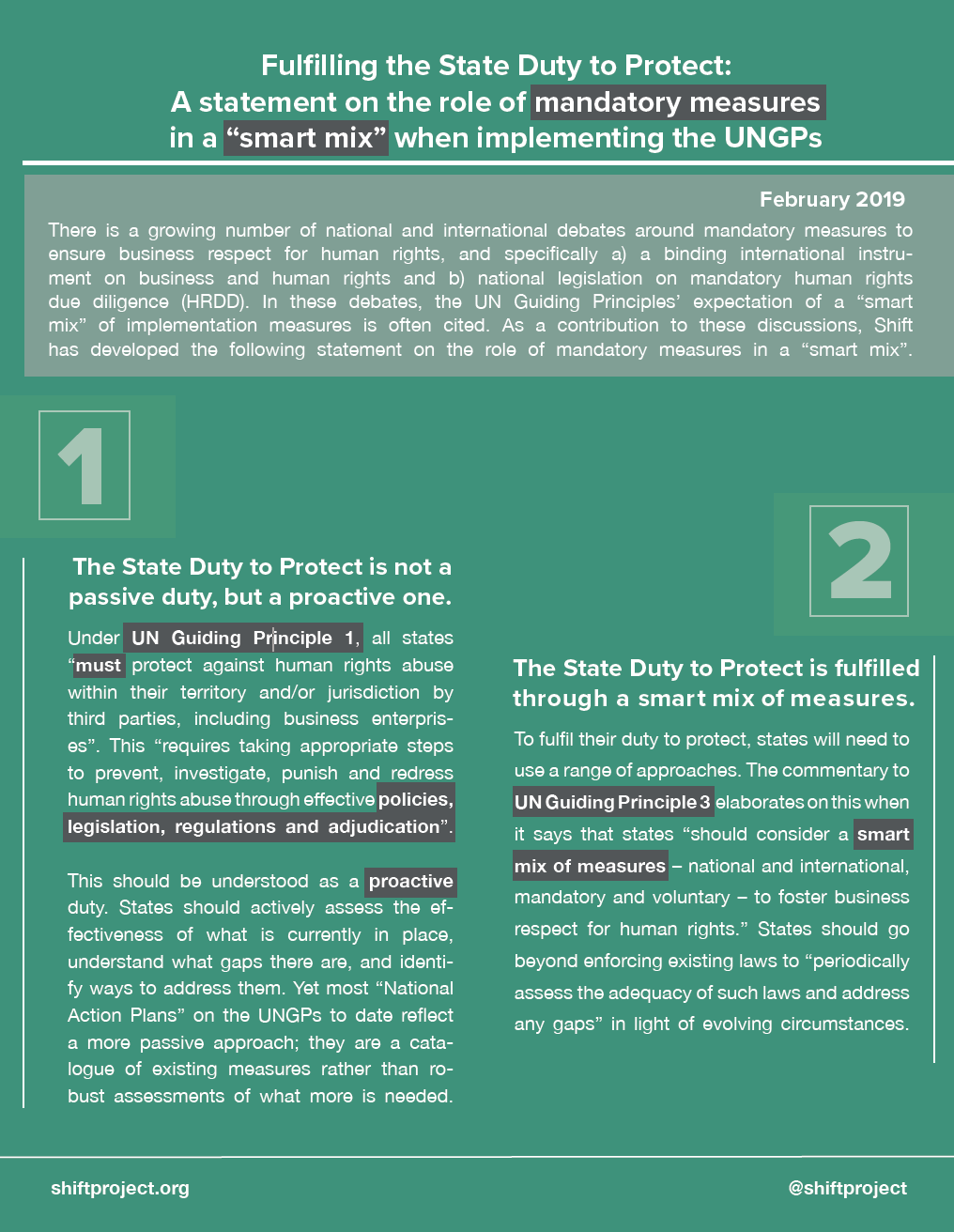Archives: Resources
Conference ‘Business & Human Rights: Towards a Common Agenda for Action’
In December 2019, Shift and the Finnish Presidency to the EU Council co-organized the conference ‘Business & Human Rights: Towards a Common Agenda for Action’, a space where businesses, government representatives and civil society organizations engaged in a multi-stakeholder dialogue to discuss business and human rights and, in particular, a collaborative and constructive way forward on this critical agenda.
In his initial remarks, Professor John Ruggie emphasized that while we often hear the term ‘smart mix’ being employed to mean voluntary measures, the concept is broader and should be understood to include mandatory measures. (Watch the full video)
During the conference, participants discussed the role of state financing in promoting human rights due diligence; the role of regulation in a smart mix to foster business respect for human rights; and the use of collective leverage and cooperation to improve human rights outcomes. The conference concluded with the launch of Agenda for Action -the outcome paper of the conference.
Handling and Resolving Local-Level Concerns and Grievances
Shift worked with ICMM in 2018 and 2019 to update the guidance they provide to their members on how to put in place effective operational-level grievance mechanisms, in line with the effectiveness criteria of the UN Guiding Principles. Our role included co-facilitating workshops with ICMM members; developing case studies with the support of ICMM members and inputting into the new guidance.
Keynote Address by John Ruggie at the Conference ‘Business & Human Rights: Towards a Common Agenda for Action’
These remarks were originally delivered by Professor John Ruggie at the Conference ‘Business & Human Rights: Towards a Common Agenda for Action’, on December 2, 2019. The Conference was co-organized by Shift and the Finnish Presidency of the Council of the EU.
Many thanks to the government of Finland for convening this timely and important conference.
It is timely because a new European Parliament has been elected and a new Commission selected. It is important because we live in a turbulent world that challenges foundational premises we had been able to take for granted. The European Union is one of the most significant governance innovations in modern times. It all began modestly, with six countries coordinating their coal and steel sectors in the wake of World War II. Today, the EU – whether it is 27 or 28 – constitutes an economic and social superpower. Now more than ever, the EU needs to think of itself in those terms.
I am pleased that Finland chose business
and human rights as the focus of its EU Presidency and of this
conference. It leads us to address the people part of the people and
planet challenges faced by all humanity. The conference agenda asks the
question: How do we most effectively advance action on the EU level? My
job this morning is to sketch out the backstory to our discussions and
suggest some strategic directions.
Let me begin with the most basic question:
What is business and human rights all about? The answer varies depending on the vantage point. In big-picture terms, it is about the social sustainability of globalization. Some years ago, my favorite boss, Kofi Annan, said: “if we cannot make globalization work for all, in the end it will work for none.” Today, people around the world are telling us that we have fallen short, that the benefits and burdens of globalization have been unequally distributed within and among nations. The result is public resentment and loss of trust in institutions of all kinds.
When seen from the perspective of enterprises, business and human rights is about ways they can recover trust and manage the risk of harmful impacts. Undeniable progress has been achieved by individual firms, business associations, and even sports organizations. But not enough, and not by enough of them.
For governments, business and human rights is at the core of new social contracts they need to construct for and with their populations. This includes decent work and living wages, equal pay for work of equal value, social and economic inclusion, education suitable to the needs and opportunities of the 21st century, and effective social safety nets to buffer unexpected shocks to the economy or the person.
For governments, business and human rights is at the core of new social contracts they need to construct for and with their populations.
For the individual person whose rights are impacted by enterprises, business and human rights is about nothing more – but also nothing less – than being treated with respect, no matter who they are and whatever their station in life may be, and to obtain remedy where harm is done.
My second point is to remind us that
formal international recognition of business and human rights as a
distinct policy domain is relatively recent. At the UN level, the first
and thus far only formal recognition dates to 2011, when the Human
Rights Council unanimously endorsed the Guiding Principles on Business
and Human Rights.
The UN Guiding Principles rest on three pillars:

The state duty to protect against human rights harm by third parties, including business; the responsibility of enterprises to respect human rights, regardless of whether states meet their own obligations; and the need for greater access to remedy
by people whose human rights have been abused by business conduct. The
OECD Guidelines on Multinational Enterprises quickly incorporated Pillar
II virtually verbatim.
The UNGPs comprise 31 Principles and Commentary on what each means and implies for all actors: states, enterprises, as well as affected individuals and communities. They are not merely a text. They were intended to help generate a new regulatory dynamic, one in which public and private governance systems, corporate as well as civil, each come to add distinct value, compensate for one another’s weaknesses, and play mutually reinforcing roles—out of which a more comprehensive and effective global regime might evolve.
That brings me to the key issue of strategy – how to reinforce and add to this transformative dynamic. The Guiding Principles embody two core strategic concepts: advocating a “smart mix of measures,” and using “leverage.” I’ll take them up in turn.
We often hear the term “smart mix of measures” being employed to mean voluntary measures alone. But that gets it wrong. Guiding Principle 1 says that states must have effective legislation and regulation in place to protect against human rights harm by businesses. Guiding Principle 3 adds that states should periodically review the adequacy of such measures and update them if necessary. They should also ensure that related areas of law, for example corporate law and securities regulation, do not constrain but enable business respect for human rights. So, a smart mix means exactly what it says: a combination of voluntary and mandatory, as well as national and international measures.
We often hear the term “smart mix of measures” being employed to mean voluntary measures alone. But that gets it wrong. (…) A smart mix means exactly what it says: a combination of voluntary and mandatory, as well as national and international measures.
A number of EU member states and the EU as a whole have begun to put in place mandatory measures that reinforce what previously was voluntary guidance to firms on corporate responsibility. These include reporting requirements regarding modern slavery, conflict minerals, and non-financial performance more broadly, as well as human rights and environmental due diligence. Such initiatives are aligned with the spirit of the UNGPs, and they are important steps in adding “mandatory measures” into the mix. Still, many leave a lot to the imagination – of company staff, consulting firms, and civil society actors among others. More should be done to specify what meaningful implementation looks like, in order to avoid contributing to the proliferation of self-defined standards and storytelling by firms. Also, with limited exceptions currently no direct consequences follow from non-compliance. Nevertheless, the ascent of Pillar I is underway.
Using leverage
A second key strategic concept embedded in the UNGPs is “leverage.” Here are three examples of how leverage can play into the core question of how most effectively to advance implementation at the EU level.
- First, individual member states and the EU as a whole are economic actors: they procure goods and services, provide export credit and investment insurance, issue official loans and grants, and so on. Each agency involved has particular objectives of its own, to be sure. But in all cases, they should consider the actual and potential human rights impacts of beneficiary enterprises with which they engage.
- Second, the UNGPs state that the responsibility of enterprises to respect human rights requires that they avoid causing, contributing to, or otherwise being linked to adverse impacts, and to address them when they occur. This extends throughout their value chains. Of course, all firms, including the suppliers of goods and services within global value chains, have the same responsibility to respect. But parent companies and companies at the apex of producer- or buyer-led value chains should also use whatever leverage they have in relation to their subsidiaries, contractors, and other actors in their network of business relationships. They should establish clear policies and operational procedures that embed respecting rights throughout their entire value chain system. Where leverage is limited it may be possible to increase it, for example by providing incentives or collaborating with other actors.
In turn, home, as well as host states of multinational enterprises, have significant roles to play through laws and regulations that enable and support private international ordering of this sort. Global value chains are exceedingly complex. If parent or lead companies fear that they may be held legally liable for any human rights harm anywhere within their value chains, irrespective of the circumstances of their involvement, it would create the perverse incentive to distance themselves from such entities. It is important that regulation gets the balance right. - A third way in which leverage can play into effective implementation at the EU level is by reinforcing positive trends already underway in the business community, but which need strengthening. Perhaps the most important instance today is ESG investing – investment decisions that combine environmental, social, and governance criteria with financial analytics. ESG investing now accounts for $31 trillion of all assets under management worldwide, or one-quarter of the global total. And while it may not be known to many investors themselves, the S in ESG is all about human rights. It seeks to assess how firms conduct themselves in relation to the broad spectrum of internal and external stakeholders – workers, end-users, and communities. It typically includes such categories as health and safety, workplace relations, diversity and social inclusion, human capital development, responsible marketing and R&D, community relations, and company involvement in projects that may affect vulnerable populations in particular.
But here is the problem: it is now generally agreed that a major impediment to the further rapid growth in ESG investing is the poor quality of ESG data provided by raters. Common taxonomies and templates are still in their infancy and evolving haphazardly even as demand for ESG products is increasing. This poses problems for investors who seek ESG opportunities and may be paying a high price for flawed data, as well as for companies striving to improve their practices that go unrecognized. The problem is especially severe in the S category – addressing human rights-related issues.
In short, a great variety of opportunities exists for exercising leverage in order to generate further positive developments in business and human rights.
The EU has developed a comprehensive taxonomy for investment on climate-related standards, indices, and disclosure. That should have a significant impact for strengthening the E in ESG. Also issuing official guidance to the S in ESG investing, making clear its human rights bases, could have a transformative effect on global capital markets.
In short, a great variety of opportunities exists for exercising leverage in order to generate further positive developments in business and human rights.
Allow me briefly to add two thoughts in closing.
The first is that business and human rights, by definition, is a domain that requires horizontal vision and cross-functional collaboration – whether within companies, governments, or the EU. Within the European Commission the task has been largely left to the External Action Service, with the support of other directorates-general. That is too narrow a lens to do justice to the broad array of challenges, and to have the impact that could be achieved. One of the singular contributions of National Action Plans for implementing the Guiding Principles is that they have required the whole of governments, for the first time ever, to consider business and human rights as a single policy space. The same holds true at the EU level.
My other concluding thought concerns the ongoing negotiations on a binding business and human rights treaty in Geneva. International legalization is both inevitable and desirable to help level the playing field in a world of global business. In fact, at the conclusion of my mandate in 2011, I proposed that governments negotiate a targeted legal instrument addressing business involvement in gross human rights violations, coupled with the need for greater cooperation between states to provide remedy. Some parties objected on the grounds that this did not go far enough, others that it went too far. It became the only one of my recommendations that did not get adopted.
International legalization is both inevitable and desirable to help level the playing field in a world of global business.
The current treaty process began in 2014. From the outset, I expressed my doubts about attempting to shoehorn the entire business and human rights domain into a single, overarching treaty. In my judgment, this is far too complex and too contested a domain for such an endeavor to produce meaningful results. Indeed, the risk is that if it were to “succeed” in the sense of being adopted by some minimum required number of states, it would be by locking in lower expectations and fewer incentives for innovative practical approaches than exist today. Nothing I have seen in the five years of negotiations suggest otherwise.
Having said all that, I do find it puzzling that the EU has taken no substantive position in these treaty negotiations. It is puzzling because the EU was an early supporter of the “smart mix of measures” idea. This leads me once again to thank the government of Finland for bringing business and human rights to the forefront of its EU Presidency, with the aim of contributing to a common agenda for action. I very much hope that Finland’s successors – as well as the Commission and Parliament – will continue on this path.
Thank you for your attention, and I look forward to our discussions.
The Role of Regulation in a Mix of Measures to Foster Responsible Business Conduct
This panel was moderated by our Vice President, Rachel Davis. The panelists were:
- Nina Norjama, Director of Social Responsibility at UPM
- Salla Saastamoinen, Director for Civil and Commercial Justice at DG Just
- Filip Gregor, Head of Responsible Companies Section at Frank Bold
- Virginie Mahin, Global Social Sustainability and Human Rights Lead at Mondelez
Reporting et Droits de l’Homme en France: Phase II (FR)
Au cours de la phase 1 de cette étude, Shift a analysé le reporting en matière de droits de l’homme des 20 plus grandes entreprises françaises de 2017 et début 2018, avant que les entreprises ne soient tenues de se conformer à la loi sur le devoir de vigilance. Dans cette deuxième phase, nous examinons leurs premiers plans de vigilance et leurs rapports de mise en œuvre de 2018 et 2019.
Cette étude en deux parties avait pour objectif de déterminer si la loi française sur le devoir de vigilance, qui impose une obligation de divulgation et de diligence raisonnable en matière de respect des droits de l’homme, aurait une influence sur la maturité du reporting des sociétés, par rapport aux attentes des Principes directeurs des Nations Unies relatifs aux entreprises et aux droits de l’homme (UNGP). Étant donné que le processus d’amélioration du reporting attire souvent l’attention des sociétés sur leur performance sous-jacente, nous avons également considéré si des améliorations pratiques pouvaient être déduites de leur reporting.
Nous espérons que les conclusions de cette étude guideront les entreprises vers un meilleur alignement avec la loi sur le devoir de vigilance et les UNGP, tout en soulignant les opportunités pour des lois similaires de mieux obtenir l’impact escompté.
SPANISH
Esta guía incluye 8 criterios de eficacia para los mecanismos de queja a nivel de la operación, tal como lo establecen los Principios Rectores de las Naciones Unidas sobre las Empresas y los Derechos Humanos, estándar internacional para los negocios y los derechos humanos.
También comparte pautas sobre cómo las compañías mineras y metalíferas deben diseñar mecanismos efectivos que brinden un sistema para gestionar y resolver las preocupaciones o quejas de las comunidades, y proporciona herramientas prácticas para ayudar a las compañías en su implementación.
ENGLISH
Shift worked with ICMM in 2018 and 2019 to update the guidance they provide to their members on how to put in place effective operational-level grievance mechanisms, in line with the effectiveness criteria of the UN Guiding Principles. Our role included co-facilitating workshops with ICMM members; developing case studies with the support of ICMM members and inputting into the new guidance.
Human Rights Reporting in France: Phase II (EN)
In Phase 1 of this study, Shift analyzed the human rights reporting of the 20 largest French companies from 2017 and early 2018, before companies were required to comply with the Duty of Vigilance Law. In this second phase, we examine their first vigilance plans and implementation reports from 2018 and 2019.
This two-part study aims to uncover whether the French Duty of Vigilance Law, which imposes mandatory human rights due diligence and reporting, would have any influence on the maturity of the companies’ public disclosure, as measured against the expectations of the UN Guiding Principles on Business and Human Rights (UNGPs). Since the process of improving public reporting frequently motivates more attention by companies to their underlying performance, we also considered whether improvements in companies’ human rights policies, processes and practices might be inferred from any progress in their disclosure.
We hope the key findings from this study can guide companies towards better alignment with the intent of the Duty of Vigilance Law, and the UNGPs, as well as highlight opportunities for ensuring similar legislations fully achieve their intended impact.
Let’s Talk Mandatory Measures: Supporting a Meaningful Discussion Among all Stakeholders
Under Pillar 1 of the UN Guiding Principles, all states “must protect against human rights abuse within their territory and/or jurisdiction by third parties, including business enterprises”. To do so, states “should consider a smart mix of measures – national and international, mandatory and voluntary – to foster business respect for human rights.”
Yet despite this encouragement to consider them, mandatory measures have not been a central part of the mix considered by states in the initial years of UNGPs implementation, outside of certain reporting requirements. That is now changing, particularly in Europe. A growing number of states are actively considering the use of mandatory due diligence measures to advance business respect for human rights.
In France, the Netherlands, Germany, Finland, the UK, Norway and Switzerland, we see governments and legislatures adopting or exploring mandatory measures as part of a mix of policy tools to incentivize business respect for human rights. In a growing number of cases, these measures go beyond reporting obligations to encompass comprehensive human rights due diligence. Continue reading…
“The UNGPs always envisaged that states would adopt a smart mix of measures – voluntary and mandatory – to ensure that businesses respect human rights. We’ve heard the phrase a lot over the last eight years, but it’s mostly been used to describe voluntary measures and states have generally been less willing to explore the mandatory part of the picture. That is now starting to change. As the company, government and civil society voices highlighted here show, there is a growing consensus that we need to get better at talking about what mandatory measures could look like. At Shift, we have made it a priority to support this conversation.”
Rachel Davis – Vice President of Shift










